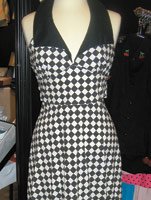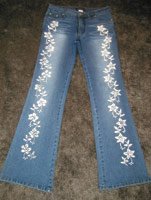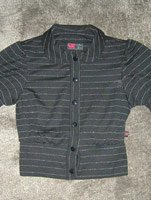The Wrap on Industry (212)
NEW YORK—Fashion trade show Industry (212) decided to go solo for its latest run, moving the dates to be the only fashion trade show in town.
The new dates may have contributed to a decrease in traffic at the show, but organizers said they were pleased with the attendance and participation and are confident both will pick up in the future.
Industry (212) debuted a new look to go with the new dates during its June 2–4 run at the Jacob Javits Convention Center on Manhattan’s West Side.
The show’s facelift included a re-merchandised floor, fashionable stillwalks (a large area where mannequins and display boxes feature the latest trends for retailers) and lots of new resources.
Attendance was off about 16 percent compared to last year’s show in May, according to show organizers, who reported approximately 5,000 attendees turned out this time, compared with last year’s almost 6,000 attendees. The retail turnout included primarily East Coast boutiques, specialty stores and chains. Buyers shopped the 350 or so exhibitors showcasing more than 600 lines. Still, show organizers are optimistic with the overall turnout of the show.
“We are quite satisfied with the attendance and are pleased with the event,” said Ernae Mothershed, public relations manager for the show. “As one of the first standalone markets for Industry (212), this event was a success.
“The change in date pattern affected show participation moderately,” Mothershed added. “However, as many exhibitors and retailers will confirm, Industry (212) was a success and showed significant upgrades in exhibitor quality, attendee quality, merchandising, amenities and organization. Based on conversations with our customers, we anticipate growth for the next show [in November].”
Categories included junior, young contemporary, better contemporary, casual lifestyle, streetwear and accessories.
The new look of the show comes as an effort to re-brand Industry (212), according to show organizers. Mothershed said that the company’s efforts include a reorganized team, especially in the marketing and retailing departments, who are bringing in higher quality products and creating a better environment for easier shopping. “We’ve also created a new banner program in the city,” she said, which promoted the show throughout parts of New York City.
“We’re bringing the show up a notch,” added Show Director Jesse Allen, who has also brought in more men’s resources to help broaden the show’s appeal.
Last year, the show was held a month earlier during the first week of May, a date that coincided with other fashion trade shows such as Moda Manhattan and ENK’s Intermezzo. Both Mothershed and Allen said it was a conscious effort on Industry (212)’s part to move the show up and not compete with the other two shows. “It’s working toward the show’s advantage,” they said. But some exhibitors disagreed.
“I would like to see the show moved back to May,” said Eric Choi, president of Los Angeles– based young contemporary manufacturer Miss Me, whose 10x40-foot booth was one of the show’s larger sizes. “We haven’t seen as many upscale customers who usually stop in to buy items from the line.” Choi, who exhibits his Miss Me line three times a year at Industry (212), suggested the lack of traffic could be due in part to the show’s new dates.
Other junior and young contemporary exhibitors such as Oakland, Calif.–based Emily the Strange and New York–based Blue Plate also said traffic was slow; however, they were still writing orders.
“It’s worth it for us to do this show,” said Lesley Vonderheide, East Coast sales rep for Emily, whose booth was located in the shows noticeably larger streetwear section. “But it doesn’t have that excitement. It could be way more worth doing.”
Alina Perez, a sales rep for Blue Plate, said sales were stronger on opening day but had cooled off by the second day of the show.
“January was a good show,” she said. “This time it feels a little smaller.”
Sales reps at Los Angeles–based T-shirt label New Breed Girl agreed, adding that despite a turnout of the company’s regular East Coast customers, they had better success at January’s show. “It’s worth the trip though,” said West Coast rep Sid Moises. “We got four or five new accounts.”
Jon Day, sales manager for Santa Ana, Calif.–based Steady Clothing said he landed a few new accounts too. “The traffic overall is slow but we’re writing good orders,” he said.
Fashion focus: Summer
On the fashion front, the offerings ranged from immediate items for Summer ’04 to Fall and Holiday.
At Miss Me, pretty sequined tops, sheer tanks and camis and colorfully patterned full skirts were all the rage. “We do well with everything,” said Choi, “but the sequined pieces are selling very well.” The manufacturer was also showing its new Miss Me Jeans line, which offered an assortment of five-pocket styles in different washes.
Blue Plate also debuted a jeans line. The new collection offered an array of embellished and embroidered jeans from glitzy sequined looks to more bohemian styles. “Anything with embellishment is doing well for us,” said Perez, who was selling the Fall/Holiday lines. “The Indian/hippie look is definitely coming back.” Ponchos, tulle skirts, full skirts, novelty T-shirts and embellished shoes were all hot sellers.
Los Angeles–based young contemporary label Glitz is being discontinued according to head designer Liza Guetierrez, who was selling the label’s last season along with junior label Kik Girl (which Guetierrez also designs) and men’s streetwear label Greed. “We’re focusing on making Kik Girl slightly more feminine,” she explained. “It will, of course, still have the Kik Girl vibe, but now we’re adding some ’glitz’ to it.” A good example and key item from the line’s Fall/Holiday pickings was a black short-sleeve cropped top with thin metallic silver stripes going across. For men, Greed’s pinstripe button- front shirt with Hawaiian flowers and a pinstriped blazer were the hot tickets.
At Gardena, Calif.–based BC Footwear and Seychelles, “mocs” (a stylish rendition of moccasins) were key. “We’re doing amazing with them,” said Danny Silvera, the company’s public relations and marketing executive. Silvera said that while he mostly saw East Coast retailers, he did sell to San Francisco–based retailers Brown Eyed Girl and Red Dot. “We’ve been working with a lot of independent boutiques,” he said. “It’s great because a lot of them are saying business is good so they’re expanding into shoes.”
Lip Service, the Los Angeles–based goth/punk/rock/glam/fetish clothing label, was showing immediate through Fall deliveries in the streetwear section. Top sellers in both the men’s and women’s lines included velvet jackets, trousers, coats and minis and a black faux-fur jacket with perforated “leatherette.”
“It’s like Sean John with balls,” described sales rep Bryn Thomas.
New faces at (212)
There were several new exhibitors, Esprit being one of the most notable. The young women’s label dropped out of the U.S. market for 2 years after it shuttered its San Francisco operations. (The company is now based in Dusseldorf, Germany.)
“We wanted to do this show to reintroduce the brand to independent chains and boutiques,” explained Tim Gorgol, executive sales manager. Gorgol also said Esprit intends to do more shows like Industry (212) to market the brand to the fashion industry in the United States. Esprit was selling all three divisions—its casual sportswear line Esprit, better career line Esprit Collection and junior line EDC by Esprit.
310 Motoring was also a first-time exhibitor. The Los Angeles– based automotive customization specialist, known for customizing cars for celebrities, entertainers and athletes, was showing its newly launched branded apparel and footwear line for men.
The “urban elite” Fall collection included a variety of stylish leather and cashmere hook-ups, velour racing suits, wool sweaters, denim bottoms and cotton, silk or cashmere tops, as well as accessories including leather bags. The footwear, which is manufactured by Manhattan Beach, Calif.–based footwear brand Skechers, featured the same accent materials like chrome and wood burl used in its customized cars.
For brand-new labels such as Miami-based Tricia Fix, a line of funky handmade reworked vintage pieces, and Not Your Average, a new line of sarcastic and humorous screen printed tees and tanks, Industry (212) was a great vehicle for exposure and for opening new markets. “This show has been very helpful,” said Not Your Average owners Cheryl Waltuch and Eli Naranjo (Naranjo was wearing a tee from the line that read “Remember Carbs”) “We’ve opened lots of new markets,” she said.
The same went for Montreal-based Plane Jane, a brand-new young contemporary label for women and men whose screened T-shirts sported flirtatious sayings such as “Tight As A Drum” or “Ask not what Jane can do for you, but what you can do for Jane.” “Yesterday was great,” said owner Hardip Manku on the second day of the show. Manku said the company is planning on hitting the trade show circuit aggressively. “Today is a bit slower, but it’s still more than we expected.”
























